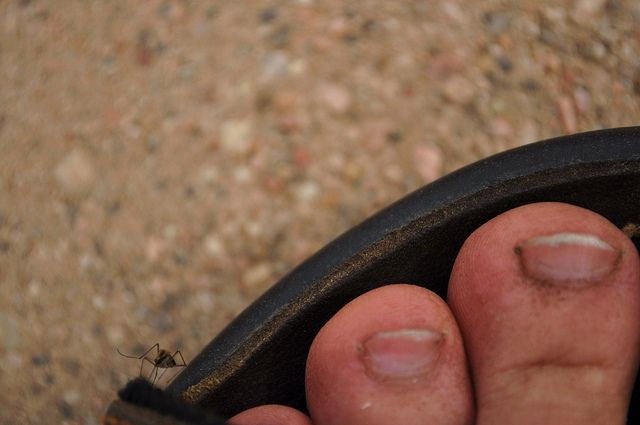B.O. Lures Malaria-Infected Mosquitos, Stinky Feet Three Times More Likely To Get Bitten

While stinky feet drive people away, mosquitoes carrying life-threatening malaria are lured to the smell, a new study shows.
Researchers embarked on the onerous task of collecting foot odor from dirty socks to understand whether female Anopheles gambiae mosquitos were manipulated by the malaria-causing parasites within to seek smelly foot odor. In the pilot study published in PLOSONE, they found that these mosquitoes were three times more likely to land and bite compared to uninfected mosquitoes.
"Exploring this further opens up the possibility that we could use this knowledge against the parasite by developing tools with crucial chemicals found in human odor," said James Logan, lead author and senior lecturer in medical entomology at the London School of Hygiene & Tropical Medicine.
In a laboratory experiment, scientists reared infected and uninfected mosquitoes and released them into a cage olfactometer, which measured their landing responses on a bag filled with human foot odor and another bag, representing the control, without the stench.
While both mosquito groups were slow to land on the stench-free sock sack, a large number of them flocked towards the smelly scent. More importantly, the infected mosquitoes were more drawn to the odor-carrying sack compared to the the uninfected group.
The team believes they have found how the parasite changes the host mosquito's olfactory behavior, or their perception of smell, in order to ensure their spread.
"It has previously been shown that parasites are able to manipulate the behavior of insects involved in their transmission and reproductive survival," Logan said. "For example, malaria-infected mosquitoes take larger blood meals than uninfected ones, and will take multiple blood meals."
Their related study involved recruiting volunteers who had their odor collected as they perspired. The smelly odor was then sent through a tube and when given the opportunity, the mosquitoes were more drawn to the odor-carrying tube compared to an odorless one.
Logan added that their next step would be to identify specific chemical compounds in the odor that could be remade synthetically to capture mosquitoes. While the task is challenging considering their heightened sense of smell, the experiment could catapult researchers into methods capable of trapping them before they bite.
Malaria is life-threatening and causes more than 600,000 deaths worldwide, mostly in children in Africa. While non-immune travellers are more vulnerable to the disease, preventive measures are effective at reducing the burden, according to the World Health Organization.
Source: Smallegange RC, van Gemert GJ, van de Vegte-Bolmer M, et al. Malaria infected mosquitoes express enhanced attraction to human odor. PLOSONE. 2013.



























